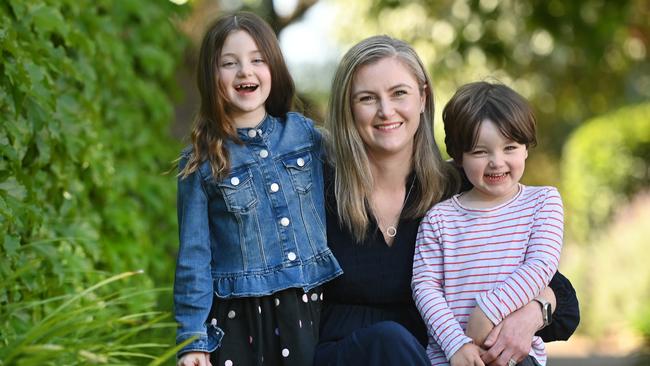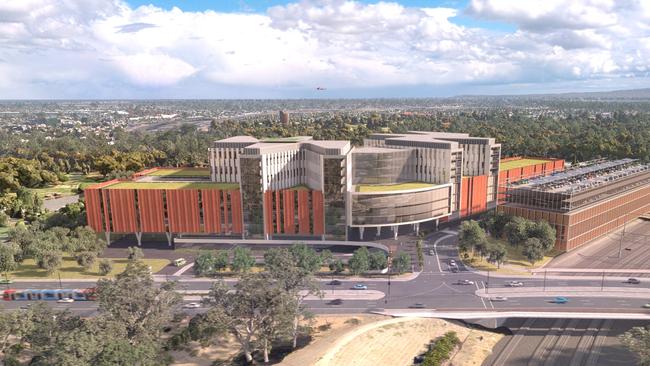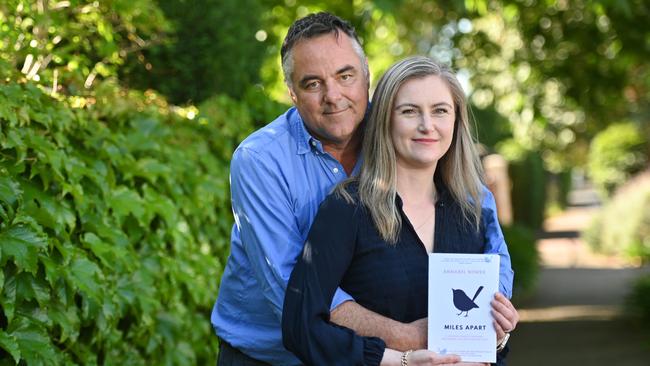Adelaide mum Annabel Bower shares story of son’s stillbirth to help other grieving parents
When Annabel Bower entered the maternity ward to give birth to her son Miles, she already knew she would be leaving without him.
SA News
Don't miss out on the headlines from SA News. Followed categories will be added to My News.
When Annabel Bower entered the maternity ward to give birth to her son Miles she already knew she would be leaving without him.
Her fourth child was born still at 23 weeks gestation after a routine scan revealed a blood clot in his brain.
“It was absolutely harrowing because you know at the end you don’t get to take your baby home,” Mrs Bower, 42, recalled.
“It’s really hard to describe just how hard it is to pick yourself up and walk out of that room after going through labour and meeting your baby for the first time and then ... having to say goodbye.
“It’s the most bizarre feeling in the world to walk out of hospital and leave your baby there.”
Mrs Bower is sharing her family’s story to raise awareness of pregnancy and infant loss during October, as new research from the Gidget Foundation shows how many parents struggle to share their grief with others.

Mrs Bower’s pregnancy with Miles had been smooth until a 20 week scan revealed a shock that led to “a horrendous terminal or life-limiting diagnosis”.
A blood clot had formed in Miles’ brain following a haemorrhage and it was blocking the flow of spinal fluid, causing a pooling of fluid in his brain.
Mrs Bower and husband Josh, 48, were told they could continue with the pregnancy knowing Miles likely would not live and they risked “his brain and skull expanding to such a point that it ruptured (Mrs Bower’s) uterus” or “deliver at 23 weeks knowing that he would pass away”.
“You’re really stuck between an impossible choice and an impossible choice,” she said.
Mrs Bower had already given birth to three children - sons Alfie, now 14, and Ted, 12, and daughter Bonnie, 7 - and described her induced labour and birth with Miles at the Women’s and Children’s Hospital in December, 2018, as “incredibly draining because I knew at the end there was going to be no (baby’s) cry”.
“It was very deflating, but also beautiful,” she said.
“There was fear in seeing him, because I’d never seen a baby who wasn’t alive, but also immense pride.
“There was the love and the maternal instinct but coupled with having to say goodbye and let go, knowing that you never, ever, ever get another chance. The minute you put the baby down and leave the room your time with them, physically, is over forever.”

When the time came to leave hospital, the Bowers had to exit past other smiling families, holding balloons celebrating new arrivals, to the sounds of newborn cries.
Mrs Bower has suggested that authorities designing Adelaide’s new Women’s and Children’s Hospital, due to open in 2030, create a separate entrance to the maternity ward for bereaved families.
“In this day and age there should be a better option to not add that layer of trauma,” she said.
Health Minister Chris Picton said the design of the new WCH “will be closely informed by feedback from families with lived experience”.
Each day six babies are stillborn around Australia and about 100,000 families face pregnancy loss or the death of an infant each year.
New research from Gidget Foundation Australia has revealed the difficulties these bereaved parents face.
Following a miscarriage two in five said they felt alone in their grief and the same proportion did not want to burden others with their pain.
Among fathers of stillborn children, or infants who died, one-third said the biggest challenge was not knowing how to explain their loss to family, friends or colleagues.
Two in five fathers said people had been dismissive or minimised their loss, compared to one in three mothers.
Gidget Foundation clinical team leader Katie Peterson said grieving parents were often overwhelmed by their feelings “and can struggle with connecting with family, friends and others as they think others don’t understand what they are going through”.
After Miles’ stillbirth, Mrs Bower realised there was still “a huge amount of silence” around losing a baby.
“It’s a grief which is often dismissed or kept in secrecy. I didn’t realise how many friends of mine had lost babies but never said anything,” she said.
“We shouldn’t still be having to pretend like it doesn’t hurt or it doesn’t have a lasting impact.”
Some of Mrs Bower’s most difficult moments came when people made throwaway comments or avoided talking about Miles at all.
“What was really hard was when I’d run into someone for the first time since losing him and it was just ignored,” she said.
“There were also a lot of throwaway comments ... like ‘You’re young, you can try again’ or ‘focus on the beautiful children you have’ or ‘perhaps it was for the best, there was probably something wrong with the baby’.”
In contrast, Mrs Bower said it was comforting when people acknowledged her loss and offered practical help, like cooking meals for the family.
She encourages people to tell someone they know who has lost a baby “how sorry you are, ask about the baby and mention the baby by name if they were named”.

If he had lived, Miles would be turning five this December and preparing to start school next year.
He would also be an older brother to Tom, now 3, who was born 10 days before the first anniversary of Miles’ delivery.
Mrs Bower said the stresses and fears of “pregnancy after loss” were also not talked about enough.
“Everyone is so excited ... but for me, being pregnant with Tom felt like I was holding my breath under water for nine months just waiting for something to go wrong again,” she said.
To support bereaved parents, Mrs Bower has written a book, Miles Apart, which is distributed through hospitals, clinics and Gidget Foundation houses around the country.





